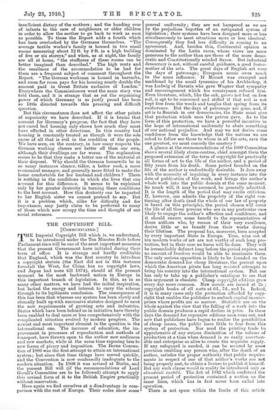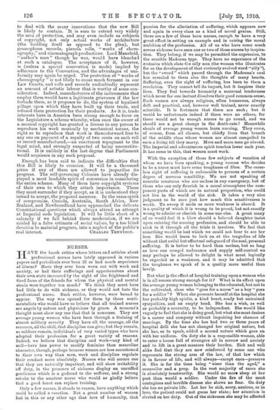THE COPYRIGHT BILL.
[COMMUNICATED.]
THE Imperial Copyright Bill which is, we understand, to be introduced under the Ten Minutes Rule before Parliament rises will be one of the most important measures that the present Government have initiated during their term of office. It is strange and hardly creditable that England, which was the °first country to introduce a copyright statute (the East did not in this instance forestall the West, for China has no copyright laws, and Japan had none till 1874), should at the present moment be the most backward nation in Europe in this important branch of legislation. In this, as in so many other matters, we have had the initial inspiration, but lacked the energy and interest to carry the scheme through to its legitimate conclusion. The consequence of this has been that whereas our system has been slowly and clumsily built up with successive statutes designed to meet the new requirements of growing arts and industries, States which have been behind us in initiative have thereby been enabled to deal more or less comprehensively with the complicated situation evolved by modern progress. The newest and most important element in the question is the international one. The increase of education, the im- provement in processes of reproduction and methods of transport, have thrown open to the author new audiences and new markets, while at the same time exposing him to new forms of piracy and imposition. The Berne Conven- tion of 1886 was the first attempt to attain an international system ; but since that time things have moved quickly, and the Convention is now confessedly inadequate to the modern situation. In 1908 it was revised at Berlin, and the present Bill will (if the recommendations of Lord Gorell's Committee are to be followed) attempt to apply this revised form of it to the British Empire practically without reservation.
here again we find ourselves at a disadvantage in com- parison with the rest of Europe. Their codes show some general uniformity ; they are not hampered as we are by the prejudices begotten of an antiquated system of legislation; their systems have been designed more or less simultaneously to meet situations more or less identical. Consequently they find less difficulty in coming to an agreement. And, besides this, Continental opinion is dominated by the Latin races, whose views are more generous to the author than are those of the more demo- cratic and Constitutionally minded Saxon. But industrial democracy is not, without careful guidance, a good. foster- mother of the arts. The great days of English art were the days of patronage ; European music owes much to the same influence. If Mozart was cramped and maddened by the small tyrannies of his Archbishop, it was Ludwig of Bavaria who gave Wagner that sympathy and encouragement which his countrymen refused him. Even literature, which, like the oak, grows not but on free soil, is apt to be coarsened and stifled if that soil is not kept free from the weeds and tangles that spring from its exuberance. But the days of patronage are gone, and, if art is to flourish in our democracies, the State must give that protection which once the patron gave. As to the form of this protection, we have a powerful incentive in the hope of international uniformity to abate something of our national prejudice. And may we not derive some confidence from the knowledge that the nations we are asked to follow are those to whom in all the arts, save the one greatest, we must concede the mastery ?
A glance at the recommendations of the 1909 Committee shows several likely storm-centres, chief amongst them the proposed extension of the term of copyright for practically all forms of art to the life of the author, and a period of fifty veers from his death. Some period founded on the life of the author is undoubtedly desirable. It does away with the necessity of inquiring in every instance into the date of publication of the work, and brings the author's whole work into the public domain at the same moment. So much will, it may he assumed, be generally admitted. It is the length of the period that may excite criticism. If, however, one admits the propriety of the right con- tinuing after death (and the whole of our law of property is based on this principle), the period chosen will cover the life of all those persons who are in any particular case likely to engage the author's affection and confidence, and it should ensure some benefit to the representatives of those authors who, by reason of their very excellence, derive little or no benefit from their works during their lifetime. The proposal has, moreover, been accepted by every important State in Europe. True, nine out of ten modern works of art are not worthy of such long pro- tection, but in their case no harm will be done. They will be irremediably defunct long before the period expires, and uo amount of freedom would be able to reanimate them. The only serious opposition is likely to be founded on the democratic demand for cheap literature, the pretext upon which the American pirate has long resisted attempts to bring his country into the international system. But one has only to take up a publisher's catalogue to see that this argument is obsolete. Cheap copyright editions grow every day more common. New novels are issued at 2s. ; copyright books of all sorts at 6d., 7d., and ls. Indeed, it is in many cases only the protection afforded by copy- right that enables the publisher to embark capital in enter- prises where profits are so narrow. Statistics are on the whole against the view that the falling of a work into the public domain produces a rapid decline in price. In these days the demand for expensive editions soon runs out, and now that publishers have begun to realise the possibilities of cheap issues, the public °have little to fear from this system of protection. Nor need the printing trade be apprehensive of any serious diminution of the volume of production at a, time when demand is so easily ascertain- able and enterprise so alive to create the requisite supply. If any safeguard is needed, it can be secured by some provision enabling any person who, after the death of an author, satisfies the proper authority that public require- ments in respect of one of that author's works are not being properly met, to obtain a license to publish it himself. But any such clause would in reality be introduced only es abundanti cauteld. The Act of 1842 which conferred the present period of protection contained a section on the same lines, which has in fact never been called into operation. There is not space within the limits of this article to deal with the many innovations that the new Bill is likely to contain. It is sure to extend. very widely the area of protection, and may even include as subjects of copyright, not only actual works of architecture (the building itself as opposed to the plan), but gramophone records, pianola rolls, " works of chore- ography," and cinematograph productions. Lord Mansfield, " author's man" though he was, would have blenched at such a catalogue. The acceptance of it, however, is (unless a special reservation is made) implied by adherence to the Convention, and the advantages of uni- formity may again be urged. The protection of " works of choreography " is not likely to cause much ferment in our Law Courts, and rolls and records undoubtedly represent an amount of artistic labour that is worthy of some con- sideration. Indeed, manufacturers of the instruments that employ them would have a legitimate grievance if the law forbade them, as it proposes to do, the system of legalised pillage upon which they have built up their trade, and refused them protection for their products. As it is, trade interests have in America been strong enough to force on the Legislature a scheme whereby, when once the owner of a musical copyright has granted a license to any person to reproduce his work musically by mechanical means, the right so to reproduce that work is thenceforward free to any one on payment of a royalty of two cents on each roll or record manufactured,—an enactment repugnant to the legal mind, and strongly suspected of being unconstitu- tional. It is unlikely in the last degree that Parliament would acquiesce in any such proposal.
Enough has been said to indicate the difficulties that this Bill is likely to occasion. It will be a thousand pities if any of them are allowed to jeopardise its progress. The self-governing Colonies have already dis- played a most laudable spirit of concession in considering the entire scheme. Many of them have copyright systems of their own to which they attach importance. These they must surrender if they accept, as it is understood they intend to accept, the proposed measure. In the same spirit of compromise, Canada, Australia, South Africa, New Zealand, and Newfoundland have approached the delicate Constitutional questions which always attend an attempt at Imperial code legislation. It will be little short of a calamity if we fall behind them moderation, if we are misled by a false estimate of social values, by a too blind devotion to material progress, into a neglect of the public's







































 Previous page
Previous page